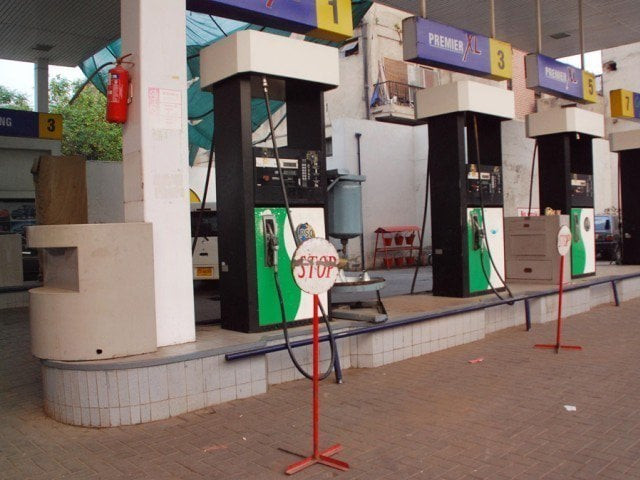Fuel could get expensive as FBR seeks greater sales tax
Proposal for next fiscal year, however, may not get govt’s seal of approval

PHOTO: RIAZ AHMED/EXPRESS
However, the government might be reluctant to approve the unpopular proposal, especially due to next year’s elections. Additionally, the proposal may end up increasing inflation beyond the projected level, with the World Bank already stating that crude oil prices will surge by 28% in 2017.
This year’s budget likely to see modest taxation measures
According to officials, the FBR has proposed that the standard sales tax rates on motor sprit oil and high-speed diesel may be increased from 17% to 20% for the upcoming fiscal year. The FBR is already charging significantly higher than standard 17% General Sales Tax (GST) on both items. It is charging 20% GST on motor-spirit and 33.5% on high-speed diesel, which is the main fuel used in public transport as well as the agriculture sector. Nevertheless, due to relatively low oil prices, the general public has not reacted to the higher rates.
Meanwhile, the tax authority has not proposed increasing the sales tax rates on kerosene oil and light diesel oil. But it proposed to increase the sales tax rates on LNG from 5% to 20%, bringing it at par with the tax rates on furnace oil - one of the fuels used for electricity generation.
Ironically, the proposal has come at a time when the federal and Punjab governments are in the process of setting up three LNG-fired power plants, which are expected to start generation from the next fiscal year. LNG is also used in production of fertilisers and any increase in input cost would adversely affect the cost of agriculture inputs.
The government’s position
According to sources, the country’s political leadership has shown reservations and is not ready to accept the FBR’s proposal. It is understood that Finance Minister Ishaq Dar is not inclined to accept the proposal as he is more comfortable with the existing arrangement of changing tax rates on petroleum products on a monthly basis through Statutory Regulatory Orders.
And, while chairing a cabinet meeting that approved the Budget Strategy Paper last week, Prime Minister Nawaz Sharif had passed general directions that efforts should be made to facilitate the agriculture sector.
The FBR’s target
For the next fiscal year, the FBR has suggested Rs3.887 trillion as the tax collection target, which the government has not yet accepted. Officials say that the finance minister wants to set the target of over Rs4 trillion, which is also close to what the International Monetary Fund has recommended.
At present, the tax authority collects roughly 17% of its total revenue from the petroleum products. However, the total amount has been seriously hampered by the government’s decision to keep oil prices unchanged in the current fiscal year - a move which deprived the FBR of approximately Rs90 billion.
Govt increases petrol prices again
According to the energy outlook of the World Bank unveiled last month, oil prices are projected to average at $55 per barrel in 2017 - up by $12 or 28% over last year. It further said that the global oil market is expected to tighten in the second quarter of 2017, mainly as a result of OPEC/non-OPEC production cuts. Oil prices are further projected to increase to $60 per barrel in 2018 as the market regains balance, with shale production limiting larger price gains.
Published in The Express Tribune, May 16th, 2017.
Like Business on Facebook, follow @TribuneBiz on Twitter to stay informed and join in the conversation.



















COMMENTS
Comments are moderated and generally will be posted if they are on-topic and not abusive.
For more information, please see our Comments FAQ